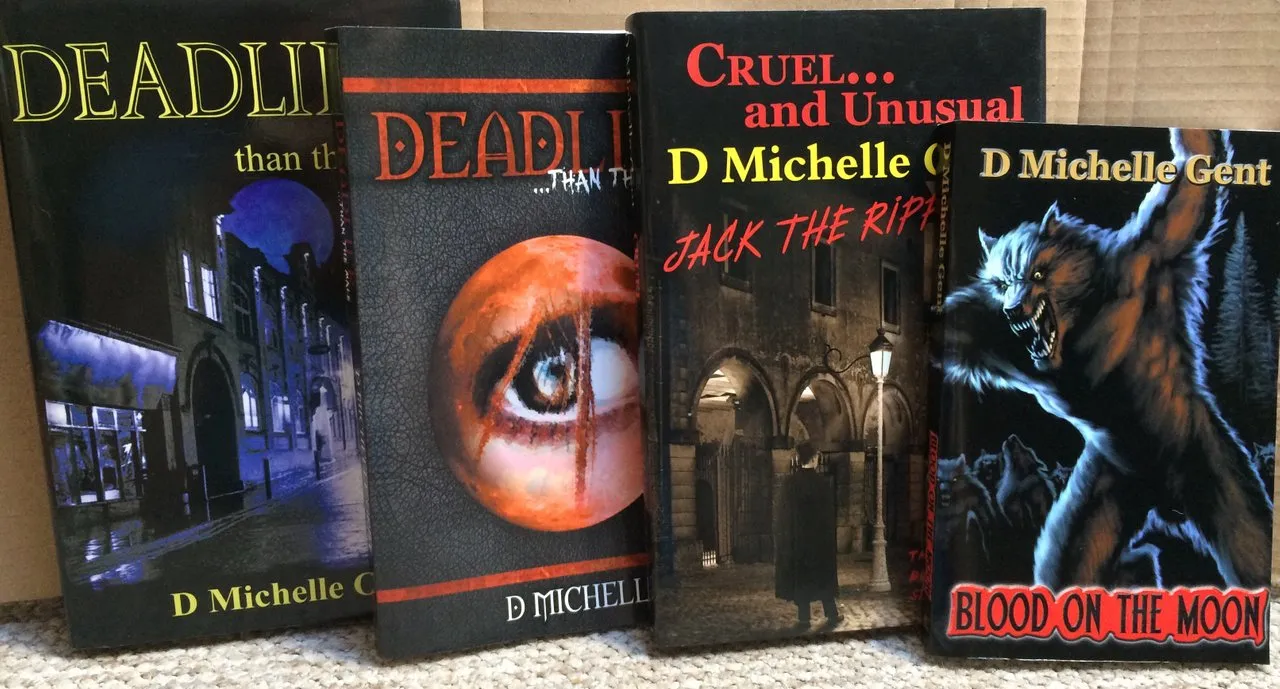I have been asked in replies on my blogs, in chat and in person. I've been asked to give tutorials and teach people how to write. I've thought about it, I've considered it and now I've started it.
I'm not sure I can teach YOU how to write like I do, but I can tell you how I developed my own style and maybe, hopefully, that will help you develop yours.

These are my books. It took two years to write my first book - and another nine years to publish it.
Google (free use) images and Pixabay
We’ve come this far together and I’m starting to gain confidence in myself – perhaps I could teach you how to write a book? Who knows until I try, right?
If you’re willing to have a go, I’m willing to take a look at your writing.
Follow these instructions or the deal’s off, ok?
No more than 1000 words. I can’t promise to read all the 1000, it depends on how many take me up on my offer.
Only work that’s posted here, in the comments will be looked at. I don’t want your links.. You’re free to post it on your blog of course, but I will NOT look at it there.
English only please.
There’s no prize, no overall winner.
I’d like a story out of this rather than a factual piece.
Here are a few tips for writing.

Write. Yes, I know… like, duh! Write every day if you can – I do. Write about things you’re interested in, write a story for some purpose – maybe a little story for your niece/nephew, child, grandparent – whatever the reason, as long as it gets you to write… even if you never show it to them… write it.
Set a word-count. When I’m writing a novel, my word count target is 3000 words per day On THAT project. Anything else is extra and not counted.

One piece of advice I found is ‘write in the same place, at the same time’ – I don’t think that’s relevant. I write wherever I feel comfortable – the garden when it’s sunny and not too windy, long-hand in a notebook, my bed, when an idea comes to me and I can’t get back to sleep and usually, it’s at the dining table on my lap-top but I don’t limit myself to there, or then.
Set a total word count for the project. Personally, I try to go for around 100,000 words per novel, BUT if you want to do a novel of 65,000 that’s perfectly fine. Don’t allow the total word count to swamp you and discourage you, however, it’s not vital and the end result is what really counts. If you’ve told your story at 50,000 words and you’re happy with it, that’s fine.
The advice of ‘write one chapter at a time doesn’t work for me – or at least, it didn’t in Cruel and Unusual. I skipped back and forth through the time-line of Jack The Ripper’s mayhem and tied it all up at the end.

Write your progress in your blog. That’s a great way of keeping the momentum.
Find an editor – a good one. Your mum, aunt, sister are all great, but unless they’re professionally trained, they won’t be any good where it counts.
Take a break – take plenty, but take them when you’ve accomplished a set amount of words, otherwise, you’ll be nipping off to the loo/for a drink/a snack/checking on social media and you’ll have spent your writing day doing nothing.
Don’t think of it as a chore, something you’ve GOT to do. If it’s hard work, you’ve got the wrong subject. Put that away and start something else.

- Talk about your book – no, not ALL the time, to EVERYONE but do talk about it. If you have someone that you can chat with about it, you’ll get the story set in your head and it will become easier to write it.
Find your own rules and work them out for you. This has got to be fun, otherwise it becomes a struggle, painful even and eventually, you’ll loathe your computer and never write.

Once a character sits down and starts telling me their story, I find I’m so enthusiastic about it that I have to write constantly. If that ever happens to you, embrace it and go with it.
Also,
You have to live the story – no… don’t go off trying to get someone to bite you (vampire novel) – I mean, the characters have to be so real inside your head that when they talk, you listen. When they end up in a bit of bother, YOUR pulse races and YOU get nervous.
If you can’t do that, you need to learn how to do it. Fake it ‘til you make it!
If you’re describing a scene, the characters and what they’re doing, you must remember what you’ve told the audience. You can’t have a character do something in your head and then expect the readers to know, if you’ve not told them.
You’re in charge of the story, you have to let everyone know what everyone else is doing or it won’t work.
Some advice tells us not to edit as you go. That’s sound advice indeed because you’ll find yourself going over and over the same piece until you’ve got it exactly as you want it and you’ll be no further forward.

I skim over what I wrote last and pick up the story from there. I find I need that bit of a reminder to get back into the flow of things. All I need is a bit of a jog – memory-wise (I don’t actually go jogging).
I also jot reminders down further down the page – that’s easy when you’re writing in your computer, but perhaps sticky-notes should be used if you’re writing long-hand (as I sometimes do).
For writing here, on Steemit, I like to give value for upvotes. I write around 1000 words per post and that’s where the word-count comes in useful, it gives a bit of discipline for your writing.
At the moment, I have that one story that’s consuming me (Ash’s story) and I’m limiting myself to 1000 words per day. Once that finishes, I may be able to get back to writing a new novel.
Ask for feedback, but do NOT take it to heart if someone doesn’t like your work. Ask for CONSTRUCTIVE criticism and ignore “Well, I just don’t like it…” type of comments. That’s not feedback.
Practice different types of writing. Flash-fiction is the shortest form. 100 words sometimes… but 200 – 700 is a good story-length. 100,000 words is an ‘Epic Novel’.
Enter the competitions here on Steemit. Competition
I’ve entered this one. Here’s my effort